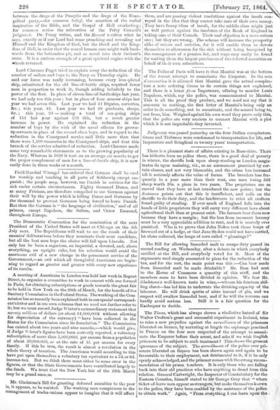Lord Clarence Paget tried to explain away the reduction of
the number of sailors and boys iu the Navy on Thursday night. He said our force was really increasing, because every iron-plated ship, substituted for the old line-of-battle ships, required fewer men in proportion to work it, though adding infinitely to the power of the fleet. In place of eleven line-of-battle ships last year, we had only ten this year ; but in place of four armour ships last year we had seven this. Last year we had 41 frigates, corvettes, &c. ; this year, 42. Last year we had 98 gunboats, sloops, &c. ; this year, 99 — making a total of sea-going ships of 154 last year against 158 this, but a much greater increase in power. He explained the reduction in the number of boys by the wish of the naval officers for grown- up servants in place of the second-class boys, and in regard to the reduction in the Coastguard service said little more than that there were 1,500 vacancies in the Coastguard ships, and that this branch of the service admitted of reduction, Lord Clarence made some very remarkable statements as to the growing popularity of the Navy. Whereas in 1859 it took on an average six months to get the proper complement of men for a line-of-battle ship, it is now easily done in three weeks or a month.






























 Previous page
Previous page